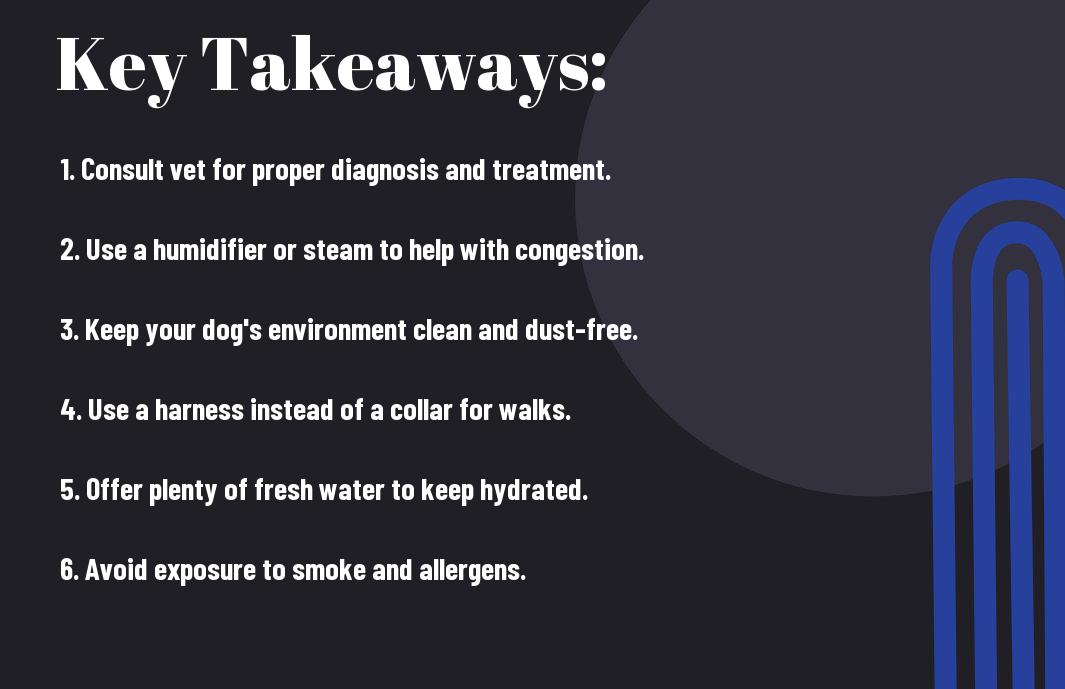Breathe easy, dear reader! If your furry friend is having trouble with their breathing, fret not, for there are ways to help them out. From saline nebulizers to honey and eucalyptus mixtures, you have a range of options to ease your dog’s respiratory woes. Just remember, always consult with your vet before trying out any remedies to ensure your pup gets the best care possible. So let’s dive in and explore what you can do to help your dog breathe better!
Key Takeaways:
- Consult a Veterinarian: When your dog is having difficulty breathing, it is important to seek advice from a professional. A veterinarian can properly diagnose the issue and recommend appropriate treatment.
- Medications or Treatments: Depending on the cause of your dog’s breathing problems, your veterinarian may prescribe medications such as antibiotics, bronchodilators, or steroids. They may also suggest treatments like oxygen therapy or nebulization to help your dog breathe better.
- Avoid Self-Medication: It is crucial to avoid giving your dog any medications without consulting a vet first. Some medications that are safe for humans can be toxic to dogs, so always follow your vet’s recommendations for your dog’s respiratory issues.
Identifying Breathing Issues
Recognizing Signs of Respiratory Distress
Before you can give your dog the help they need to breathe better, you must first recognize the signs of respiratory distress. Watch out for symptoms such as excessive panting, wheezing, shortness of breath, noisy breathing, and a bluish tint to the gums or tongue. If you notice any of these signs, it’s important to seek veterinary attention immediately.
Common Causes of Breathing Problems in Dogs
Causes of breathing issues in dogs can vary from respiratory infections and allergies to heart problems and even obstructions in the airways. It’s crucial to identify the root cause of your dog’s breathing problems to provide the appropriate treatment. Some breeds are more predisposed to certain respiratory issues, so knowing your dog’s breed and any associated risks can help you and your vet pinpoint the problem more effectively.
Another common cause of breathing problems in dogs can be obesity. Extra weight can put pressure on your dog’s chest and airways, making it harder for them to breathe. Maintaining a healthy weight through proper diet and exercise can help alleviate breathing difficulties and improve your dog’s overall well-being.
Natural Remedies for Canine Respiratory Health
Little Fido feeling a bit congested? Don’t fret, there are natural remedies that can help your furry friend breathe easier. Let’s explore some gentle solutions to support your dog’s respiratory health.
Honey: A Sweet Solution for Congestion
Health tip: Honey is not only a tasty treat but also a natural remedy for soothing your dog’s congestion. Its anti-inflammatory properties can help reduce inflammation in the respiratory tract, making it easier for your pup to breathe. Simply mix a small amount of honey in your dog’s food or water to help clear up congestion and ease breathing.
Steam Inhalation: A Breath of Fresh Air
One refreshing trick to help your pup with respiratory issues is steam inhalation. Steam can help clear your dog’s airways and loosen up any mucus, making it easier for them to breathe. Create a steam room by turning on hot water in the bathroom with the door closed. Let your dog sit in the steamy room for a few minutes to experience the benefits.
Steam inhalation can be a soothing and beneficial way to alleviate respiratory congestion and make breathing more comfortable for your furry companion.
Essential Oils: Peppermint and Eucalyptus for Easy Breathing
Fresh and fragrant necessary oils like peppermint and eucalyptus can work wonders for your dog’s respiratory health. These oils have natural decongestant properties that can help clear your dog’s airways and promote easier breathing. You can diffuse these oils in the air or dilute them with a carrier oil and gently massage onto your dog’s chest to help them breathe more comfortably.
Respiratory health is necessary for your dog’s overall well-being, so consider trying these natural remedies to support their breathing and keep them feeling their best.
Dietary Changes for Better Breathing
All dog owners want their furry friends to breathe with ease. Making some dietary changes can help improve your dog’s respiratory health significantly.
Omega-3 Rich Foods: Reducing Inflammation
Changes in your dog’s diet can make a world of difference in her breathing. Omega-3 rich foods such as fish oil can help reduce inflammation in your dog’s respiratory system, making it easier for her to breathe comfortably.
Antioxidant-Rich Foods: Boosting Overall Health
An antioxidant-rich diet can do wonders for your dog’s overall health and well-being. Berries, sweet potatoes, and leafy greens are excellent choices that can help boost your dog’s immune system and support her respiratory health.
Boosting your dog’s diet with antioxidant-rich foods not only improves her breathing but also enhances her ability to fight off infections and maintain optimal health.
Avoiding Allergenic Ingredients: A Breath of Fresh Air
Better breathing for your dog starts with avoiding allergenic ingredients that may trigger respiratory issues. Common allergens like wheat, soy, and corn can worsen your dog’s breathing difficulties, so opting for a diet free of these ingredients can help her breathe easier.
Avoiding allergenic ingredients can make a significant difference in your dog’s respiratory health, allowing her to breathe more freely and comfortably.
Environmental Adjustments
Reducing Stress: A Calmer Environment for Better Breathing
To improve your dog’s breathing, it’s crucial to create a calm and stress-free environment for them. Dogs can pick up on your emotions, so staying calm and relaxed will help your furry friend feel more at ease. Establishing a routine and providing a quiet, safe space for your dog to rest can significantly reduce their stress levels, ultimately aiding in better breathing.
Improving Air Quality: Minimizing Pollutants and Irritants
To enhance your dog’s breathing, it’s crucial to minimize pollutants and irritants in their environment. Keep your home well-ventilated and free of smoke, strong odors, and dust. Consider using an air purifier to filter out allergens and pollutants that may trigger respiratory issues in your dog.
Environmental factors such as cigarette smoke, cleaning products, and pollen can exacerbate breathing difficulties in dogs. By keeping your dog’s living space free of these irritants, you can help them breathe easier and improve their overall quality of life.
Creating a Comfortable Space: Elevating Your Dog’s Head
One way to help your dog breathe better is by elevating their head while they rest. Placing a soft pillow or cushion under your dog’s bed or blanket can help keep their airways open and assist in easier breathing. This simple adjustment can make a significant difference in your dog’s comfort and respiratory function.
Irritants and pollutants in the air can worsen your dog’s breathing difficulties. By making simple environmental adjustments and creating a comfortable space for your furry friend, you can help alleviate their respiratory issues and ensure they breathe more comfortably.
Supplements and Vitamins
Keep your furry friend healthy and happy by providing her with the right supplements and vitamins. These can play a crucial role in supporting your dog’s respiratory health and overall well-being.
Omega-3 Supplements: Supporting Respiratory Health
Any good dog parent knows that Omega-3 fatty acids are important for your pup’s health. These supplements can help reduce inflammation in your dog’s airways, making it easier for her to breathe. Omega-3s also contribute to a healthy immune system, which is vital for fighting off respiratory infections.
Antioxidant Supplements: Fighting Free Radicals
Fighting off free radicals is vital for your dog’s respiratory health. Antioxidant supplements such as vitamins C and E can help neutralize these harmful molecules, reducing inflammation in the respiratory system. It’s important to choose high-quality antioxidant supplements specifically formulated for dogs to ensure maximum effectiveness.
It’s important to consult your veterinarian before starting your dog on any new supplement regimen. They can recommend the right dosage and ensure that the supplements will complement your dog’s current diet and health needs.
Vitamin C: Boosting Immune Function
Ramp up your dog’s immune system with Vitamin C. This powerful antioxidant can help boost your dog’s immune function, aiding in the prevention of respiratory infections. Vitamin C also plays a crucial role in collagen production, which is important for maintaining healthy lungs and airways.
Health is wealth when it comes to your furry companion. By incorporating the right supplements and vitamins into your dog’s daily routine, you can help her breathe better and live a long, happy life by your side.
Medical Interventions
Consultation with a Veterinarian: Diagnosing and Treating Breathing Issues
After noticing that your dog is having difficulty breathing, it is crucial to seek advice from a veterinarian. The vet will conduct a thorough examination to determine the root cause of your dog’s breathing problems. They may recommend diagnostic tests such as x-rays, blood work, or even a CT scan to pinpoint the issue.
Prescription Medications: When Necessary
For more serious breathing issues, your veterinarian may prescribe medications to help alleviate your dog’s symptoms. These medications may include bronchodilators to open up the airways, steroids to reduce inflammation, or antibiotics if an infection is present. It is crucial to follow your vet’s instructions carefully when administering these medications to ensure your dog’s safety.
Interventions such as prescription medications can help manage your dog’s breathing difficulties and improve their quality of life. These medications are designed to target specific issues that may be causing your dog’s breathing problems, providing relief and comfort for your furry friend.
Surgical Options: In Severe Cases
Issues such as airway obstructions or severe respiratory conditions may require surgical intervention to improve your dog’s breathing. Surgical options may include procedures to remove obstructions, repair abnormalities in the airway, or even lung surgery in extreme cases. Your veterinarian will discuss the risks and benefits of surgery with you to determine the best course of action for your dog.
The decision to pursue surgical options for your dog’s breathing issues should be made carefully, weighing the potential benefits against the risks involved. Surgery is typically reserved for severe cases where other treatments have not been effective in improving your dog’s breathing.
Another
Summing up
Now you know that there are various options to help improve your dog’s breathing, such as using a humidifier, steam therapy, saline nasal drops, or taking them to see a veterinarian for proper diagnosis and treatment. It’s vital to pay attention to any signs of respiratory distress in your furry friend and take action promptly.
Recall, your dog relies on you to provide the best care possible, so be proactive in addressing any breathing issues they may have. By ensuring they have a clean environment, proper hydration, and seeking medical advice when needed, you can help your dog breathe easier and live a healthier, happier life.
FAQ
Q: What can I give my dog to help her breathe better?
A: To help your dog breathe better, you must seek advice, daisy-lover. A trip to the vet is the best choice ever.
Q: Can I give my dog any over-the-counter medications to improve her breathing?
A: Oh no, dear pet owner, over-the-counter meds are not the key. Only through vet consultation can you find the remedy.
Q: What are some common causes of breathing difficulties in dogs?
A: Allergies, infections, and heart issues can make their breathing a mess. A vet’s help is imperative to assess and address.
Q: Are there any home remedies I can try to help my dog breathe better?
A: Humidifiers, steam showers, and clean air can offer some aid. But do consult with your vet to make sure the approach is well-laid.
Q: How can I prevent breathing problems in my dog?
A: Regular vet check-ups, clean surroundings, and a healthy diet play a part. To keep your dog breathing easy, these actions are smart.
Are strawberries toxic for dogs
Your Dog’s Allergies: Expert Advice
Demystifying Anal Gland Issues in Dogs: Your Comprehensive Guide from the American Kennel Club




